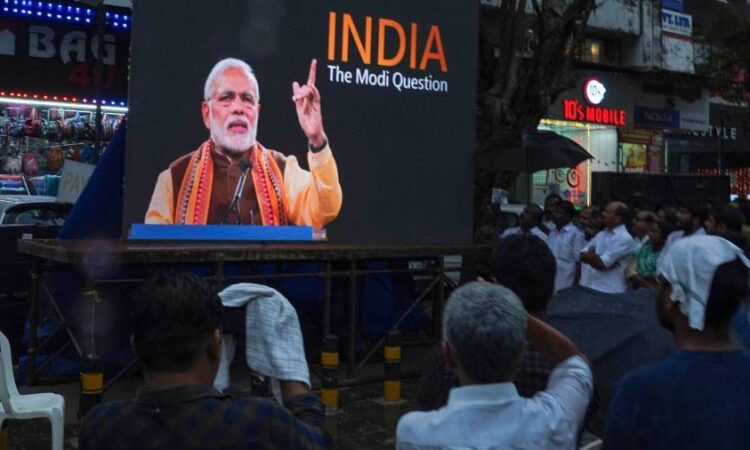
Indian authorities have launched an investigation into the BBC over alleged financial irregularities in a deepening clampdown on the British broadcaster following its airing of a documentary critical of Prime Minister Narendra Modi.
Indian media reported on Thursday that the Enforcement Directorate, the country’s financial crimes agency, was investigating alleged violations of foreign exchange rules by the BBC, following a three-day search of the broadcaster’s New Delhi and Mumbai offices in February.
“We will continue to co-operate fully with the Indian authorities to ensure that we comply with all our obligations,” the BBC told the Financial Times on Thursday.
Word of the probe, which was first reported by the Press Trust of India and Asian News International, came less than two months after tax authorities raided the bureaus in New Delhi and Mumbai following the broadcast of a documentary about deadly riots in Gujarat in 2002.
The two-part documentary, which aired in January, raised questions about Modi’s actions during the 2002 unrest when he was Gujarat’s chief minister. More than 1,000 people, mostly Muslims, died.
The documentary’s second part focused on India’s policies towards its Muslim minority in the years since Modi’s Hindu nationalist Bharatiya Janata Party took national power in 2014.
The government dismissed the film as a “propaganda piece” and invoked emergency legislation to block its broadcast in India, but many locals circumvented the ban and watched it using virtual private networks.
ANI reported that the directorate had filed a case against the BBC under the Foreign Exchange Management Act for alleged “irregularities in foreign funding”.
PTI, citing unnamed official sources, reported that the financial crimes agency, in addition to filing the case, had demanded documents and statements from some of the corporation’s executives. The FT ascertained that several BBC employees had already been questioned as part of this investigation.
India has a record of opening tax and regulatory probes against non-governmental groups and opposition politicians who have been critical of government policies.
Enforcement Directorate officials did not respond to requests for comment.
During February’s tax survey at BBC’s New Delhi headquarters, inspectors confiscated some journalists’ phones and logged into computers, according to eyewitnesses.
The probe comes at a time of deteriorating press freedoms in India and tension between New Delhi and London.
Police in New Delhi last month downgraded security at Britain’s High Commission in an apparent response to a protest at India’s High Commission in London, where separatist Sikh protesters tore down an Indian flag.
British and US government officials have been reluctant to criticise the crackdown on the BBC and shrinking press freedom in India.
“The BBC is quite rightly operationally and editorially independent from His Majesty’s Government,” David Rutley, the UK’s under secretary of state for Foreign, Commonwealth and Development Affairs, told parliament in February.
“Respect for the rule of law is an essential element of an effective democracy, as are an independent media and freedom of speech.”
UK prime minister Rishi Sunak on Thursday sought to allay some of India’s concerns in a telephone call with Modi.
An account of the call from Downing Street, Sunak’s official residence, said the two men agreed to “expedite progress” on a bilateral trade deal, which some reports had said was faltering because of the tensions.
Downing Street said the prime minister had reiterated his condemnation of the “unacceptable violence” outside the Indian High Commission in London.
“He stressed that extremism had no place in the UK and updated on the steps being taken to ensure the security of Indian High Commission staff,” Sunak’s office said.



